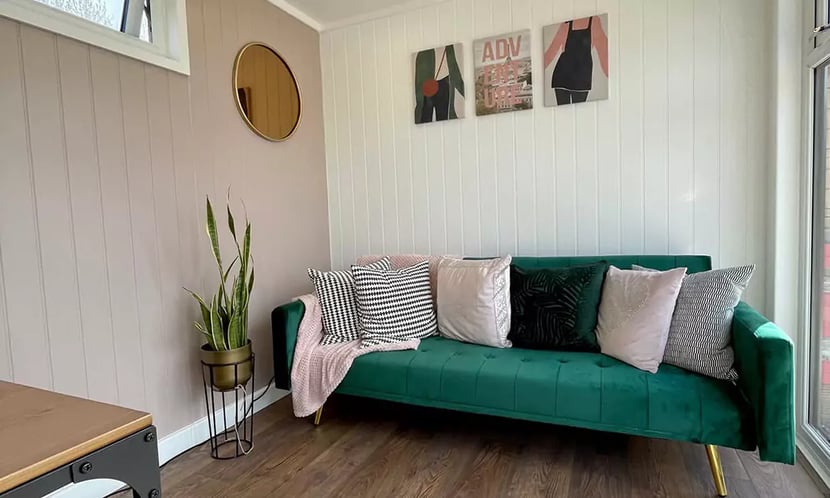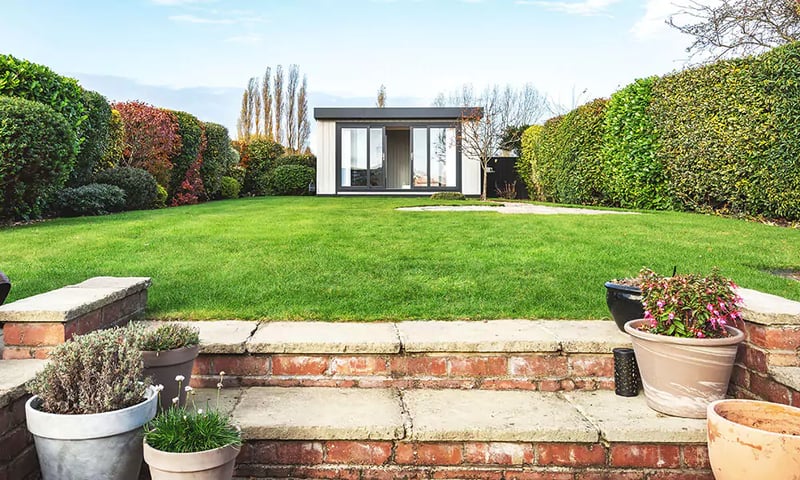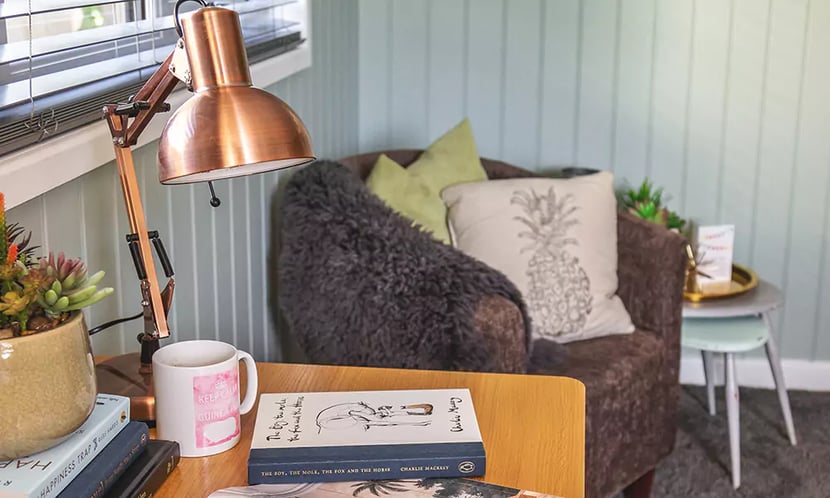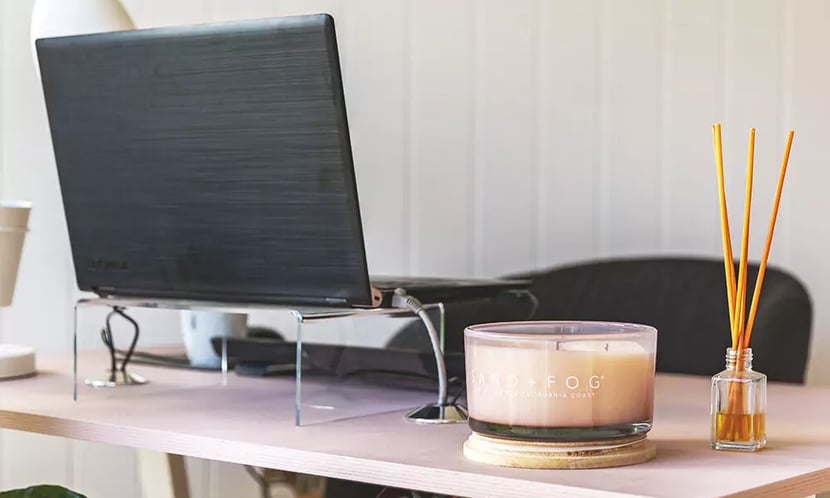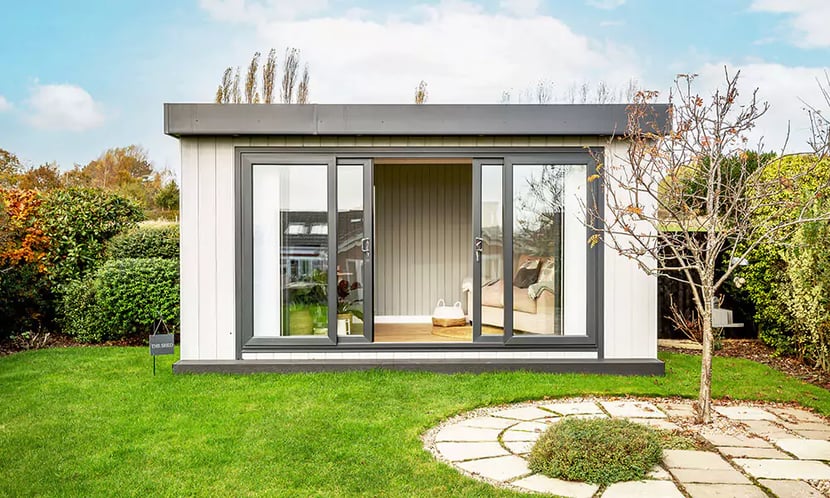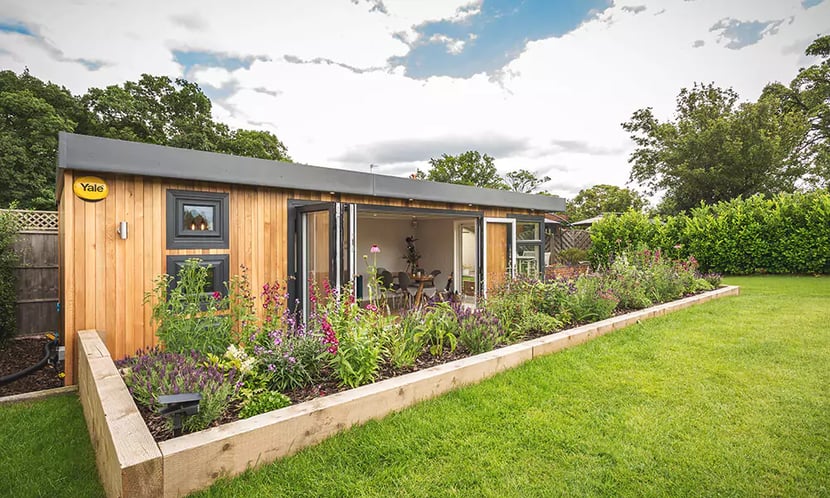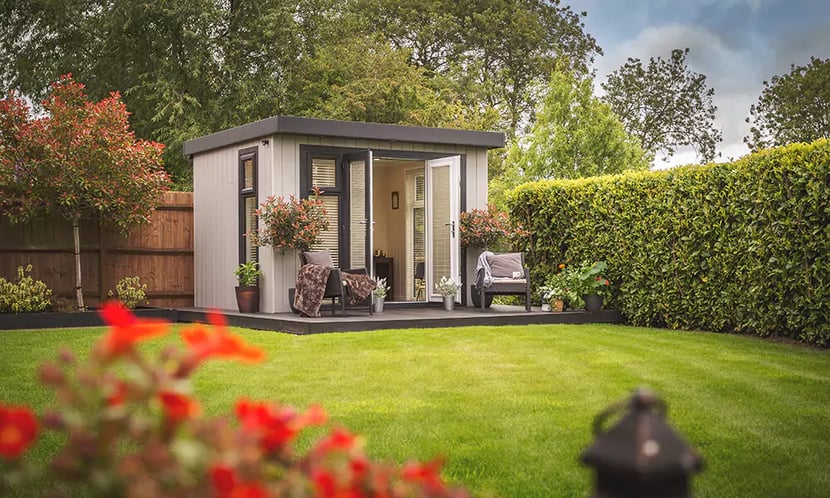
The Complete Guide to Building a Garden Office with a Toilet & Kitchen
If you're thinking of upgrading your work-from-home setup, you’ve come to the right place. A home office isn’t just a quiet place to work; it can also include all the conveniences of home, such as a toilet and kitchen. In this guide, we’ll walk you through everything you need to know to build your own fully-equipped premium garden office with a toilet and kitchen, while keeping UK laws and guidelines in mind. From planning to utilities, we’ll cover it all.
Looking to create your own pressure treated garden room with a toilet and kitchen? Cabin Master designs bespoke garden offices and garden rooms to our customers’ specifications, ensuring no two cabins are the same! Discover how a fully insulated garden room with a bathroom could be the perfect solution for you.
If you have an idea for your perfect home office with toilet and kitchen, contact our expert design team today to discuss turning your garden into the ultimate space for work or relaxation. You can also view our small garden building price page for guide prices on some of our previous prefab garden room with bathroom builds.
Why Consider a Garden Office with Amenities?
The idea of a garden office has taken off for many reasons—flexibility, convenience, and a chance to work close to nature, to name a few. But why stop at a mere workspace when you can upgrade your garden office building into a fully functional unit like a garden room with toilet and kitchenette? Here are some compelling reasons to consider a garden office with a toilet and kitchen.
Benefits of Having a Garden Office with Toilet and Kitchen
Streamlined Workday
With a toilet and kitchen in your garden office, you can essentially eliminate the commute between your workspace and main home. This means more focused work time, and it adds up—saving just 15 minutes a day results in over 90 hours saved in a year.
Self-sufficiency
Having all these amenities in one place means you don't have to rely on your home for breaks, snacks, or even quick meals. It's like having a mini home-office that's both practical and convenient.
Fewer Household Interruptions
Being closer to home yet physically separated minimises interruptions from family members or household chores. You’re out of sight, reducing the temptation for others to disturb you. Opt for a garden room with toilet and shower to further reduce the need to go back to your main home.
Long-term Investment
Adding a garden office with toilet and kitchen facilities will likely increase the resale value of your property. It becomes an attractive feature for future buyers looking for multifunctional spaces.
Multipurpose Space
The amenities make it a versatile space that can transform into a guest house, teen’s den, or even a rentable unit, offering you more for your investment in the long run.
Legal Requirements and Planning
So, you're sold on the idea of a garden office with all the amenities. But before you start dreaming about the colour schemes and office furniture, it's crucial to understand the legalities involved. From planning permissions to building regulations, there are several boxes to tick to ensure that your garden office is up to code.
Do You Need Planning Permission?
The need for planning permission for a home office varies depending on a range of factors, such as the size of the structure, its proximity to your main residence, and local council guidelines. In the UK, many garden offices fall under "permitted development," which means they don't require planning permission. However, this can change if your garden office includes a toilet and kitchen, as these amenities may alter its classification.
Planning Permission Guidelines
To avoid any unpleasant surprises, it's a good idea to consult with your local council early on. Some general guidelines that may require you to obtain planning permission in the UK include:
- If the garden office takes up more than 50% of your garden space
- If the structure is higher than 2.5 metres
- If you plan to use the office for accommodation purposes
- If the building will be located in a conservation area or within the boundary of a listed building
Consult garden room experts to make sure your outdoor office meets regulations.
Ensuring Plumbing Complies with Building Regulations
Once you've cleared the hurdle of planning permission, the next legal requirement to consider is ensuring that the plumbing system in your garden office complies with UK building regulations. You'll likely need to:
- Use approved materials for pipes and fixtures
- Ensure proper waste disposal methods
- Provide sufficient ventilation
- Install adequate safety measures like non-slip floors and scald-preventing devices
It's highly recommended to consult a certified plumber who is well-versed in UK building regulations to make sure all plumbing work is compliant.
Planning Permission Guidelines
If you find that planning permission is required, you'll need to:
Submit Plans: These usually involve architectural drawings and site plans.
Public Notices: Your local council may require you to inform your neighbours or even post public notices about the planned construction.
Inspections: Expect periodic inspections to ensure compliance with the planning permission granted.
Utility Considerations
An outdoor office space with a toilet and kitchen requires more than just an electrical connection; you'll also need to think about water supply, drainage, and possibly even gas if you're planning to have a more extensive kitchen setup. Here are the key utility considerations to keep in mind.
Connecting to Mains Services
Connecting your garden office to mains services is crucial for it to function as a self-contained unit. This usually involves extending your home's existing utilities to the new structure. It's always advisable to hire certified professionals for this job to ensure safety and compliance with local regulations.
Providing a Water Supply to the Garden Room
Water is essential for both the toilet and kitchen. Here's what you need to consider:
- Assess the distance and feasibility of connecting to your home's water supply
- Determine if the existing water pressure is sufficient or if you'll need additional pumps
- Take into account seasonal considerations, such as the potential for freezing pipes in winter
Water/Drainage Connection
When building a fully insulated garden office equipped with a toilet and kitchen, water supply and drainage are two essential utilities to consider. These systems not only need to be functional but also must comply with local regulations and building codes. Here are some key aspects to consider:
Plan for a Sewage Connection or a Self-Contained Waste Solution
If your garden office is close to your main house, connecting to the existing sewage system might be the most straightforward solution. However, if the garden office is located at a distance, installing a self-contained waste solution like a septic tank or a composting toilet may be more appropriate.
Sewage Connection: Connecting to your home's existing sewage line might require digging trenches and laying pipes. You'll need to consult with local authorities to ensure that you're following the correct procedures and codes.
Self-Contained Waste Solutions: Options like composting toilets or chemical toilets don't require a connection to a sewage line, offering more flexibility in terms of where your garden office can be located.
Installing Draining Pipes
When installing drainage pipes, the slope and the material used are critical factors to consider:
Slope: Drainage pipes need a certain slope to ensure that wastewater flows away efficiently. The general guideline is a fall of 1:40, which means a 25mm drop for every metre of piping. Incorrect sloping could lead to blockages and stagnant water.
Materials: Opt for high-quality, durable materials that can withstand the wear and tear of waste and water over time. PVC and cast iron are commonly used materials that are both durable and relatively easy to install.
Electricity Needs
When planning an office space with additional amenities like a kitchen and toilet, it's crucial to consider your electricity needs. A basic garden office might only require a couple of sockets for a computer and lights, but once you add in kitchen appliances and possibly even a water heater for the bathroom, your electrical requirements become more complex. Below are some key considerations:
Estimate the Total Electrical Load to Determine if Your Existing Supply Can Handle It
Before starting the construction, it's important to estimate the total electrical load that the garden office will consume. This will include everything from computers and office equipment to kitchen appliances like fridges, microwaves, and potentially even a small oven or stove.
To ensure that your existing electrical supply can handle this added load, consult with a certified electrician. They can perform a load calculation and might suggest upgrading your main electrical panel or adding a sub-panel specifically for the garden office.
Consider the Need for Additional Outlets
The more amenities your garden office has, the more electrical outlets you will need. In a standard home office, a couple of outlets near the desk might suffice. But with the addition of a kitchen, think about where you'll place appliances and how many outlets you'll need for them.
Kitchen Area: You'll likely need multiple outlets for a fridge, microwave, kettle, and other small appliances.
Work Desk: Beyond your computer, you may have multiple devices like a printer, scanner, or additional screens.
Toilet Area: If you're adding a water heater or an electric towel rail, you'll need outlets here too.
Factor in Safety Features Like Circuit Breakers and Grounded Outlets
Electrical Circuit Safety
Circuit Breakers: To protect against electrical overload and possible fires.
Grounded Outlets: These are essential for reducing the risk of electrical shock. They are especially important in areas that might get wet, like a kitchen or bathroom.
Residual Current Devices (RCDs): These can provide additional protection against electric shock.
Conclusion
Investing in an office space with amenities like a toilet and kitchen can be a game-changer for your work-life balance and property value. It offers not only the convenience of a dedicated workspace but also the comforts of home, all while possibly boosting the value of your property. From understanding the legal requirements and planning permissions to choosing utilities and design features, there's much to consider.
We hope this comprehensive guide has shed light on the key aspects and armed you with the information you need to make informed decisions. A home office isn't just an extension of your home; it's an extension of your lifestyle.
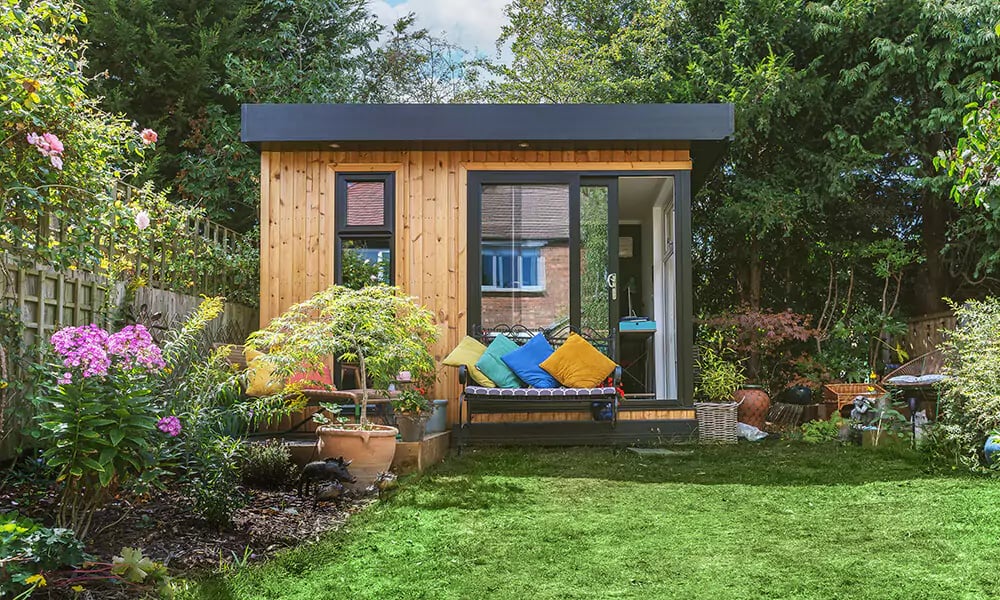 Choosing Cabin Master for your Garden Room
Choosing Cabin Master for your Garden Room
At Cabin Master, we specialise in creating bespoke garden rooms with double glazed windows that cater to your needs and preferences, ensuring you get the most out of your investment. With experienced staff and quality materials, we provide a variety of custom options to meet your specific needs. Contact our expert team today to see how we can help bring your dream garden room to life.




